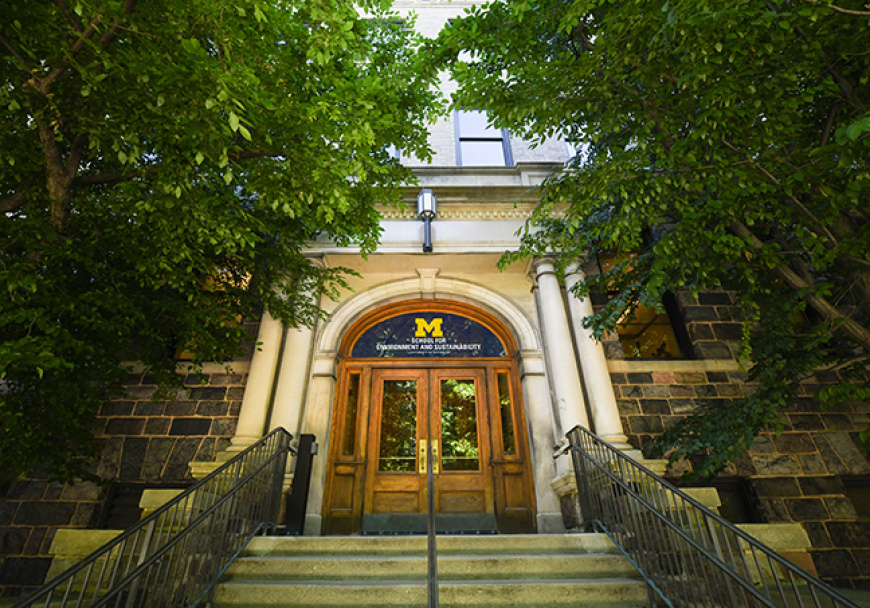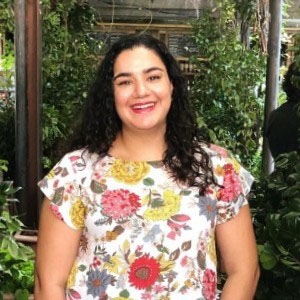
 back to all news
back to all news
SEAS alumna Malavika Sahai (MS ’18): just and equitable philanthropy

When she first came to the University of Michigan School for Environment and Sustainability (SEAS) to pursue dual tracks in Environmental Justice and Environmental Policy and Planning, alumna Malavika Sahai (MS ’18) hadn’t imagined that her career path would lead her to the field of philanthropy.
“It wasn’t until our orientation for the Environmental Fellows Program at SEAS that I even considered the specific puzzle piece that philanthropy plays in the way in which the movement moves,” said Sahai. “I inherently knew that environmental organizations operated with budgets and funding, but I never really thought about where that funding came from or what was at stake.”
Her newfound interest in funding blossomed just months after earning her master’s degree—when Sahai took a position as a communications program coordinator at the Environmental Grantmakers Association (EGA), a nonprofit organization that works with members and partners to promote just, effective philanthropy for people and the planet. Since early 2021, she has served as the director of justice and equity at EGA in New York.
 “Now that I’ve been in the space, I’ve learned so much more about how philanthropy’s administrative processes have historically been a huge burden—particularly for smaller grassroots and frontline groups—to be able to secure the funding that they need to do the work,” said Sahai.
“Now that I’ve been in the space, I’ve learned so much more about how philanthropy’s administrative processes have historically been a huge burden—particularly for smaller grassroots and frontline groups—to be able to secure the funding that they need to do the work,” said Sahai.
Formed in 1987, EGA membership spans more than 200 foundations from around the world, and includes environmental foundations, individual donors, and giving programs on multiple scales.
“What unites our members is a real interest in being able to advance sustainable solutions for people, place and planet with a racial equity focus, especially recognizing the historical marginalization of BIPOC individuals in the history of the environmental movement—and also the way in which the concept of environment is constructed,” said Sahai.
In her current role, Sahai directs EGA's signature events, including the annual fall retreat that assists hundreds of funders, representing a broad spectrum of the environmental philanthropic community, in learning about issues and collaborating on projects.
“We have this goal of using our events as key opportunities to bring our members together twice a year, and give a platform to leaders from across the movement who are advancing the most sustainable and innovative solutions on the ground—but whose stories aren’t often told.
“That’s what really energizes and excites me—finding the voices and perspectives of leaders who might not have had a lot of exposure in the past, and providing a space for them to elevate their ideas,” said Sahai.
SEAS master’s project: water justice
Reflecting on her time at U-M, which included serving as the vice president for diversity in SEAS Student Government and working as a graduate student research assistant at U-M Engineering, Sahai made special note of her master’s project.
“What I found especially significant in my time at SEAS was being able to work on a master’s project with a concrete environmental justice problem at its root, which was water affordability and household security,” said Sahai.
Sahai brought valuable experience to the project, having completed internships at the U.S. Environmental Protection Agency in the Water Enforcement Division and in the Office of Environmental Justice while earning her undergraduate degree at Virginia Tech.
Associate Professor Tony Reames, now on leave to serve as Deputy Director for Energy Justice at the U.S. Department of Energy, acted as faculty advisor for Sahai’s master project team.
“Dr. Reames guided my project group through that entire experience to make sure that we were handling the relationship with care,” Sahai related. “Because it can be very challenging to represent a research institution that is conducting a ‘case study,’ so to speak, when you are ultimately trying to advocate for that community.”
In addition to their research paper, the master’s project team developed a policy framework and a set of actionable recommendations that gained notable attention.
“I heard that members of Congress reference this framework,” said Sahai. “And that the research has been pivotal to understand how to construct issues of household affordability related to water and water justice. That is often an unseen topic, especially because of how many pressing priorities people are balancing to meet their needs and be able to survive, let alone work towards thriving in their communities.
“It’s the piece of my SEAS experience that I continually revisit, and go back to consider. How can we continue to encourage this lens across systems? Because that also drives my current work—finding systems-based solutions that center justice and equity.”

